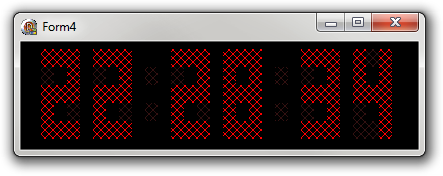How to make a Digital clock in delphi7?
I am pretty new to delphi , and would like to start with something easy . Could someone please show me an example how to make a Digital clock that will transfer the \"time\" ( h
-
Exercise 1
Drop a
TLabeland aTButtonon your form.Double-click the button, and write
procedure TForm1.Button1Click(Sender: TObject); begin Label1.Caption := TimeToStr(Time); end;Exercise 2
To get the time to update automatically, add a
TTimerto your form, and double-click it (you can remove the button if you like). Then writeprocedure TForm1.Timer1Timer(Sender: TObject); begin Label1.Caption := TimeToStr(Time); end;This code will run once a second (the default interval for a
TTimer, which is perfect for us, so we do not need to change it).Exercise 3
To make the clock more annoying, you can try this: in the interface of your form, add a private field called
FHighlight, like this:TForm1 = class(TForm) Button1: TButton; Label1: TLabel; Timer1: TTimer; procedure Button1Click(Sender: TObject); procedure Timer1Timer(Sender: TObject); private { Private declarations } FHighlight: boolean; public { Public declarations } end;Now you can do
procedure TForm1.Timer1Timer(Sender: TObject); begin Label1.Caption := TimeToStr(Time); if FHighlight then begin Label1.Color := clWhite; Label1.Font.Color := clBlack; end else begin Label1.Color := clBlack; Label1.Font.Color := clWhite; end; FHighlight := not FHighlight; end;In order for this effect to work, you need to change one of the properties of the
TLabelcontrol (design-time). ChangeTransparenttofalse, using the Object Inspector, if it isn't already.Update (Exercise 4)
Since Warren P thinks it is too boring with a plain
TLabel, this is how you can achieve a 'true' seven-segment digital clock:procedure TForm1.FormPaint(Sender: TObject); type TDigitData = array[0..6] of boolean; TPhysDigit = array[0..7] of TRect; const DIGIT: array[0..9] of TDigitData = ( (true, true, true, true, true, true, false), (false, true, true, false, false, false, false), (true, true, false, true, true, false, true), (true, true, true, true, false, false, true), (false, true, true, false, false, true, true), (true, false, true, true, false, true, true), (true, false, true, true, true, true, true), (true, true, true, false, false, false, false), (true, true, true, true, true, true, true), (true, true, true, true, false, true, true) ); var PaddingW, PaddingH, UnitX, UnitY, DigitWidth, DigitHeight, BarLengthX, BarLengthY, DigitSeparation, FieldSeparation: integer; SEGMENTS: array[0..5] of TPhysDigit; i: Integer; function TranslatePhysDigit(const PhysDigit: TPhysDigit; const DX: integer; const DY: integer = 0): TPhysDigit; var i: Integer; begin for i := 0 to 7 do begin result[i].Left := PhysDigit[i].Left + DX; result[i].Right := PhysDigit[i].Right + DX; result[i].Top := PhysDigit[i].Top + DY; result[i].Bottom := PhysDigit[i].Bottom + DY; end; end; procedure DrawDigit(const Position, Value: integer); var i: integer; begin for i := 0 to 6 do if DIGIT[Value, i] then Canvas.FillRect(SEGMENTS[Position, i]); end; procedure DrawColon(const Position: integer); var ColonRect1: TRect; ColonRect2: TRect; begin ColonRect1 := Rect(PaddingW + Position*UnitX, PaddingH + UnitY, PaddingW + (Position+1)*UnitX, PaddingH + 2*UnitY); ColonRect2 := Rect(PaddingW + Position*UnitX, PaddingH + 3*UnitY, PaddingW + (Position+1)*UnitX, PaddingH + 4*UnitY); Canvas.FillRect(ColonRect1); Canvas.FillRect(ColonRect2); end; var t: string; begin PaddingW := Width div 20; PaddingH := Height div 20; UnitX := (ClientWidth - 2*PaddingW) div 27; UnitY := (ClientHeight - 2*PaddingH) div 5; DigitWidth := 3*UnitX; DigitHeight := 5*UnitY; BarLengthX := 3*UnitX; BarLengthY := 3*UnitY; DigitSeparation := 4*UnitX; FieldSeparation := 6*UnitX; SEGMENTS[0, 0] := Rect(0, 0, DigitWidth, UnitY); SEGMENTS[0, 1] := Rect(DigitWidth - UnitX, 0, DigitWidth, BarLengthY); SEGMENTS[0, 2] := Rect(DigitWidth - UnitX, 2*UnitY, DigitWidth, DigitHeight); SEGMENTS[0, 3] := Rect(0, DigitHeight - UnitY, DigitWidth, DigitHeight); SEGMENTS[0, 4] := Rect(0, 2*UnitY, UnitX, DigitHeight); SEGMENTS[0, 5] := Rect(0, 0, UnitX, BarLengthY); SEGMENTS[0, 6] := Rect(0, 2*UnitY, DigitWidth, 3*UnitY); SEGMENTS[0] := TranslatePhysDigit(SEGMENTS[0], PaddingW, PaddingH); SEGMENTS[1] := TranslatePhysDigit(SEGMENTS[0], DigitSeparation); SEGMENTS[2] := TranslatePhysDigit(SEGMENTS[1], FieldSeparation); SEGMENTS[3] := TranslatePhysDigit(SEGMENTS[2], DigitSeparation); SEGMENTS[4] := TranslatePhysDigit(SEGMENTS[3], FieldSeparation); SEGMENTS[5] := TranslatePhysDigit(SEGMENTS[4], DigitSeparation); Canvas.Brush.Color := clBlack; Canvas.FillRect(ClientRect); Canvas.Brush.Color := clBlack; Canvas.FillRect(Rect(PaddingW, PaddingH, ClientWidth - PaddingW, ClientHeight - PaddingH)); Canvas.Brush.Color := clRed; t := FormatDateTime('hhnnss', Time); for i := 0 to 5 do DrawDigit(i, StrToInt(Copy(t, i+1, 1))); if odd(StrToInt(Copy(t, 6, 1))) then begin DrawColon(8); DrawColon(18); end; end; procedure TForm1.FormResize(Sender: TObject); begin Invalidate; end; procedure TForm1.Timer1Timer(Sender: TObject); begin Invalidate; end;
Playing with the GDI brushes:

- 热议问题

 加载中...
加载中...